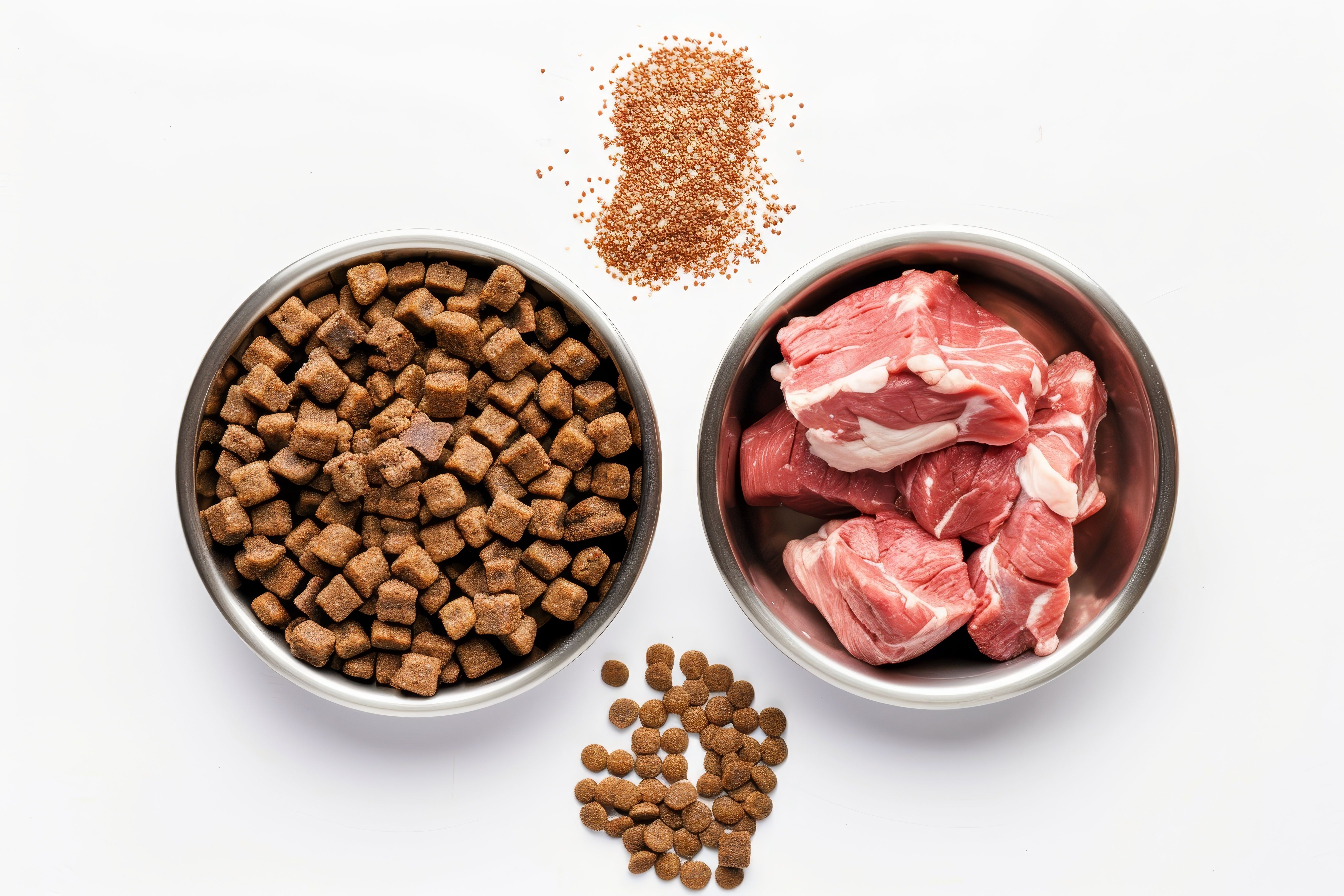Study explores effects of raw vs kibble diets on canine fecal microbiota and more
The study looked at the effect these 2 diets have on fecal microbiota composition, serum metabolomics, and inflammatory markers in dogs
Photo: VolumeThings/Adobe Stock

With the rise in pet owners feeding their dogs nontraditional raw diets, a team of researchers from Oklahoma State University (OSU) set out to explore how a raw meat-based diet impacted dogs’ fecal microbiota composition, serum metabolomics, and inflammatory markers in comparison to a kibble diet.
Veterinarians lack sufficient research data to help clients make informed choices regarding the option of raw diets for their pets, explained Lara Sypniewski, DVM, clinical associate professor in small animal primary care at OSU College of Veterinary Medicine and co-author of the study, in a university release.1 “Overall, I think this study offers people the opportunity to start with a discussion regarding a less processed or raw diet with their veterinarian,” Sypniewski said. “I believe this information can offer another feeding option for dogs with chronic inflammatory GI disease as it may improve gut homeostasis.”
The study, published earlier this year, looked at 55 dogs that that had been fed either a raw meat-based diet or a kibble diet for more than a year.1,2 Sypniewski first conducted a physical examination of each dog to confirm their overall health and collected samples to establish baseline laboratory values.
The dogs were then fed a standardized diet consisting of a single brand of either kibble or raw meat for 28 days. The dogs returned for a follow-up physical examination and sample collection on day 28. Serum and fecal samples were taken to analyze microbiota, metabolomics, and inflammatory markers.
According to the research paper, which was published in Frontiers in Veterinary Science, the fecal microbiota composition of the dogs on the kibble diet versus the raw meat-based diet was different.2 Results indicated that higher protein diets, especially those devoid of plant-based carbohydrates, affect the fecal microbiome population.
“Although microbiome populations were different, there was no significant difference in the systemic inflammatory markers evaluated, but we have to remember all dogs were healthy to begin with,” Sypniewski noted in the release.1
“Sixty- three serum metabolites differed between [kibble diet] and [raw meat-based diets]-fed dogs with the majority reflecting the differences in macronutrient composition of the two diets. Fecal [intestinal alkaline phosphatase (IAP)], [immunoglobulin G (IgG)] and IgA were significantly higher in [raw meat-based diet-fed] dogs compared to [kibble diet-fed] dogs, while systemic markers of inflammation, including serum c-reactive protein (CRP), galectin, secretory receptor of advanced glycation end-products (sRAGE), haptoglobin, and serum IgG were similar in dogs fed either diet,” wrote the study’s authors.2
According to Sypniewski, raised fecal IgA is beneficial, as low levels may be linked to inflammatory and autoimmune disease. “Fecal IgA responds to pathogens and allergens. It is a protective immunoglobulin and important for immune tolerance and keeping the commensal bacteria local to the lumen of the gut,” explained Sypniewski in the release.1
Speaking on the raised levels of IAP in dogs fed raw meat-based diets, Sypniewski said “…IAP is a protective enzyme which was much higher in raw fed dogs. Dogs with chronic enteric disease, or gastrointestinal disease, have reduced IAP. We theorize that the IAP levels in raw-fed dogs could be a sign they have reduced susceptibility to inflammatory conditions.”1
References
- OSU researchers study which is a healthier option for pet diets. Oklahoma State University. October 24, 2024. Accessed October 31, 2024. https://news.okstate.edu/magazines/veterinary-medicine/vet-voices/articles/2024/osu_researchers_study_which_is_a_healthier_option_for_pet_diets.html
- Hiney K, Sypniewski L, DeSilva U, et al. Fecal microbiota composition, serum metabolomics, and markers of inflammation in dogs fed a raw meat-based diet compared to those on A kibble diet. Frontiers in Veterinary Science. 2024;11. doi:10.3389/fvets.2024.1328513
Podcast CE: There’s a mushroom for that!
April 22nd 2023This podcast will discuss the clinical use of mushrooms in veterinary species for cancer (turkey tail, Reishi, maitake, shiitake mushrooms and chaga); vaccine titer immune competence (oyster mushroom); support of the CKD patient (cordyceps mushroom); Canine Cognitive Disorder (Lion’s Mane mushroom), and Microbiome support (all mushrooms).
Listen
Exploring the interconnected world: The relationship between human and pet microbiomes
The intricate relationship between human and pet microbiomes represents a fascinating and highly relevant area of study for veterinary professionals.
Read More